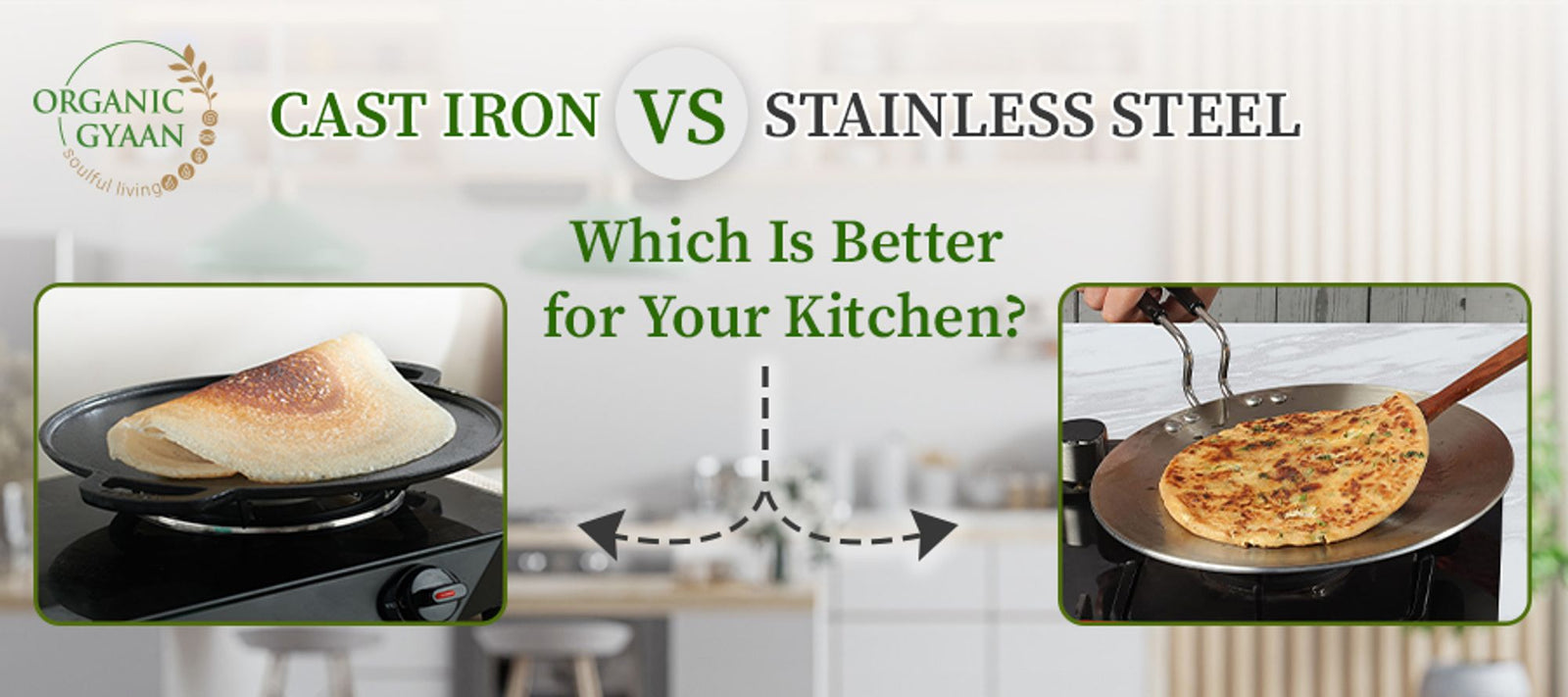When it comes to outfitting your kitchen with the best cookware, the debate between cast iron and stainless steel is a hot topic. Both materials bring their unique strengths to the table, making the choice less about which is superior and more about which is better suited to your personal wellbeing . However, for those who cherish flavor, durability, and tradition, cast iron often takes the lead. Let's dive into the characteristics of both materials, and you'll see why cast iron might just be the superior choice for your culinary adventures.
The Showdown: Cast Iron vs Stainless Steel
|
Feature |
Cast Iron |
Stainless Steel |
|
Heat Retention |
Excellent – stays hot for a very long time |
Good – but cools down quicker |
|
Heat Distribution |
heats slowly and evenly |
heats quickly and evenly |
|
Non-Stick Properties |
Naturally non-stick if seasoned properly |
Can’t act as a non stick cook - ware |
|
Durability |
Nearly indestructible |
Very durable but can dent or scratch |
|
Flavor Enhancement |
Adds a unique flavor to foods |
Does not impart additional flavors |
|
Versatility |
Ideal for slow-cooking, baking, and frying |
Best for sautéing, boiling, and simmering |
|
Price |
Generally more affordable |
Can be more expensive |
Cast Iron's Superior Qualities
1. Heat Retention: Cast iron's ability to stay hot for a very long time outperforms stainless steel, making it perfect for recipes that require consistent heat or serving meals straight from the pan.
2. Non-Stick Properties: Unlike stainless steel, which requires additional fats to prevent sticking, a properly seasoned cast iron pan naturally becomes non-stick. This feature improves with use, making cast iron pans more convenient and healthier for cooking over time.
3. Durability: The near indestructibility of cast iron means it can last a lifetime and beyond, unlike stainless steel, which, while durable, is susceptible to dents and scratches.
4. Flavor Enhancement: Cast iron cookware is known for enhancing the flavor of food. The seasoned surface contributes to building complex flavors that stainless steel pans cannot match.
5. Versatility: Cast iron's versatility is unmatched, suitable for a wide range of cooking methods, from frying and baking to braising and grilling, making it a more adaptable choice compared to stainless steel, which is often preferred for specific methods like sautéing.
6. Price: When considering the longevity, versatility, and overall benefits of cast iron, it offers more value for its price compared to stainless steel, which can be more expensive without offering the same flavor-enhancing properties or versatility.
The Stainless Steel Side
Stainless steel cookware is admired for its shiny appearance, excellent heat distribution, and easy maintenance. It's a favorite in professional kitchens for its durability and non-reactive nature, making it suitable for cooking a wide variety of foods. However, it lacks the heat retention and flavor-enhancing qualities of cast iron and often requires more fats to prevent sticking.
Conclusion
While stainless steel has its place in the kitchen, particularly for those who value ease of maintenance and quick, even heating, cast iron boasts a combination of flavor-enhancing abilities, durability, and versatility that's hard to beat. Whether you're a seasoned chef or a home cooking enthusiast, adding cast iron cookware to your collection can elevate your culinary creations in ways that stainless steel simply cannot match. So, while we appreciate the sleekness and utility of stainless steel, cast iron's rich history, superior cooking performance, and budget-friendly price point make it the standout choice for those looking to bring warmth, tradition, and unmatched quality to their kitchen. For these reasons, cast iron stands out as the superior choice for culinary enthusiasts. Ready to enhance your cooking experience? Choose our Cast Iron Cookware that best fits your kitchen's needs and start crafting delicious meals with confidence.





















